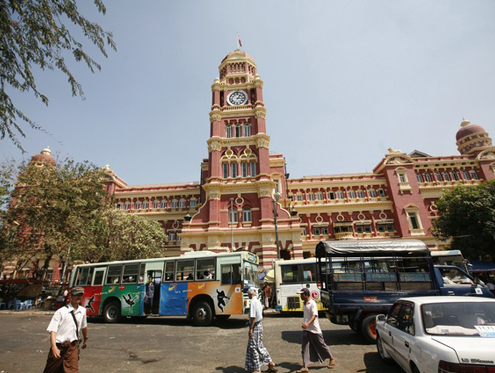The Ministry of Information (MOI) announced on Tuesday that it plans to sue the Myanmar Herald Journal for defamation after the weekly newspaper published an interview with a prominent NLD leader who made a statement which the ministry claims “hurt the dignity and rights of the state leader [President Thein Sein].”
The alleged defamatory statement was published on 9 August in the Herald’s “Politics Q&A” section, which contained an interview with Myo Yan Naung Thein, an NLD Executive Committee member who is also secretary of the party’s Central Research Supervising Team and headmaster of the Badar Political Institute.
According to the MOI announcement, the Herald quoted Myo Yan Naung Thein as saying, “The President is the head of the State but his words were gibberish, irrational, cheap and inconsistent, and that in my sense all his words were completely nonsensical, absurd and insane.”
The announcement said the Herald also defamed President Thein Sein by publishing a statement by Myo Yan Naung Thein in which he said it was “totally unclear who imparted such ludicrous ideas to the President [that would lead Thein Sein to adopt such] poor policies and lead the government.”
The MOI said it subsequently asked Burma’s Interim Press Council to instruct the Herald to provide an explanation for “the irresponsible expressions [it published] in accordance with press ethnics,” after which the Press Council made a “suggestion” to the news journal that it publicly apologise for publishing “accusations that jeopardised the image of the President”.
While the Press Council was attempting to mediate the dispute, the Herald apparently gave the council a draft apology letter that it was planning to publish.
However, after obtaining a copy of the letter, the Information Ministry decided to sue the Herald for defamation because its apology was not only insufficient, but also “further criticised other dignitaries,” according to the MOI announcement.
In an interview with DVB, the Herald’s Deputy Chief Editor Ank Khaung Min said the Herald was merely quoting the NLD member, and that the statements were not part of an editorial written or published by the news journal.
[related]
Ank Khaung Min also said the journal has not yet received notice of a lawsuit, but if necessary the Herald will fight back within the framework of the law.
“I don’t understand the Information Ministry’s rules and regulations. They want to sue the journal instead of the individual who made the statement. I think they don’t want to get into a confrontation with the NLD so they are suing the media instead,” he said.
In Burma, defamation is a criminal offence which carries a maximum punishment of two years’ imprisonment plus fines, or both. Most countries have abolished criminal defamation, however, and only permit lawsuits for civil defamation.
Thus, in most jurisdictions if the judge rules that a defamatory statement was made, the defendant might be required to pay money and/or make a public apology, but the defendant cannot be imprisoned.
Yet in Burma defamation is a criminal offence contained in Article 499 of the Penal Code, which provides that “Whoever, by words either spoken or intended to be read, makes or publishes any imputation concerning any person, intending to harm, or knowing or having reason to believe that such imputation will harm, the reputation of such person, is said … to defame that person.”
Although the above language indicates that publishers can be liable for criminal defamation, Article 501 makes this point clear by saying, “Whoever prints or engraves any matter, knowing or having good reason to believe that such matter is defamatory of any person, shall be [liable for criminal defamation and punished accordingly].”
However, the penal code also provides several exceptions that, if satisfied, will absolve defendants of liability for defamation. The second exception says that it’s not defamation “to express in good faith any opinion whatever respecting the conduct of a public servant in the discharge of his public functions, or respecting his character, so far as his character appears in that conduct.”
In other words, it would not be defamatory for a newspaper to publish a quote which says a public official is insane if, in fact, that public official’s conduct appears insane.
The ninth and tenth exceptions say that it’s not defamation if an otherwise defamatory statement or caution is made “in good faith for … the public good.”
On Tuesday, AFP wrote that the Herald is “renowned for its criticism of the government and ministers.”
DVB also reported recently that Reporters Without Borders released a statement in July saying that the Herald has previously been targeted by the government.
In its statement, Reporters Without Borders condemned Burma’s Special Branch—a police intelligence agency—for harassing the news media on the pretext of conducting financial audits, citing an incident on 23 July in which Special Branch officers went to the Herald’s office and detained three editors without any explanation.



